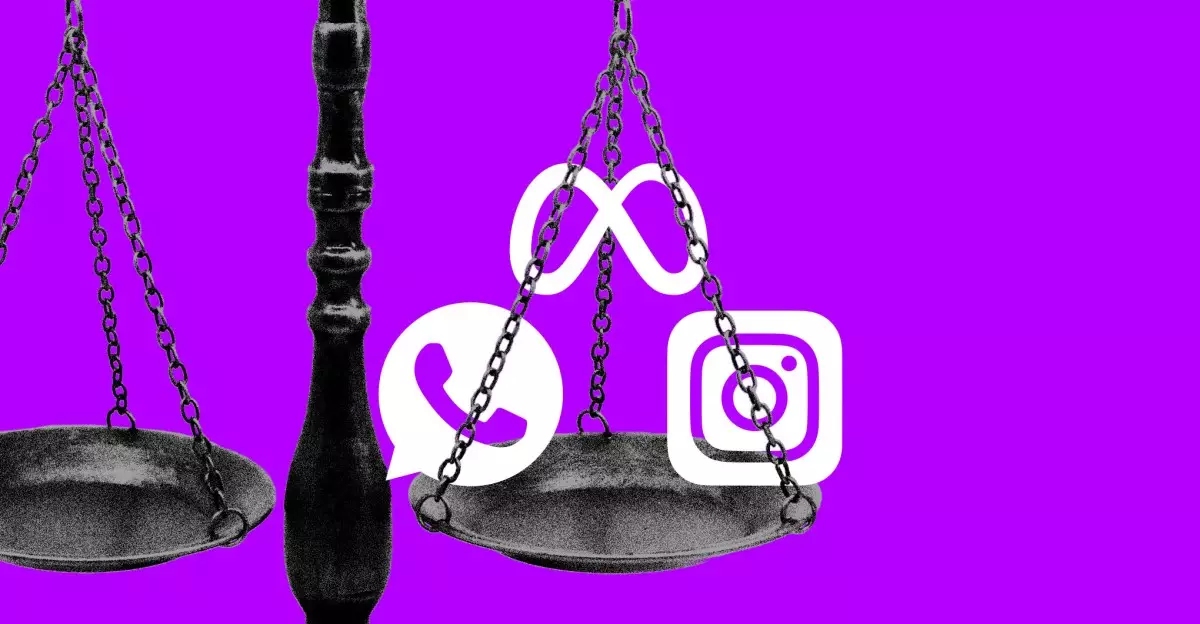In the highly publicized trial between the Federal Trade Commission (FTC) and Meta, CEO Mark Zuckerberg faced intense scrutiny regarding the company’s strategic acquisitions of WhatsApp and Instagram. As the trial unfolds, it has become evident that Zuckerberg’s vision for these platforms extends far beyond mere consolidation; he views them as essential tools for navigating an evolving digital landscape. The crux of the case hinges on whether these acquisitions were executed with altruistic intentions or if they were predatory moves aimed at undermining potential competitors.
Zuckerberg’s demeanor during the proceedings was as fascinating as the case itself. A particular moment stood out when he was asked about the hefty price tag of $19 billion for WhatsApp. His candid reply, “I’d do it again,” not only demonstrated his conviction in the acquisition but also highlighted a nuanced aspect of the tech industry: the blurred line between competition and acquisition.
The Evolution of Communication and Meta’s Strategic Moves
From Zuckerberg’s perspective, WhatsApp was more than just another messaging platform; it signified a shift in how users communicated, pivoting from public social interactions to private conversations. This observation mirrors the broader trends in digital communications, where privacy has become paramount. Zuckerberg articulated a clear vision: by acquiring WhatsApp, he believed he was seizing a “valuable” asset that would empower Facebook to adapt to this new paradigm of digital communication.
This strategic foresight was underscored by the acknowledgment of Meta’s fraught relationships with tech behemoths like Apple and Google. Zuckerberg expressed the concern that these companies could impede Meta’s distribution abilities. The acquisition of WhatsApp was, in his view, a strategic move designed to enhance Meta’s negotiating power. This perspective, while illuminating, lays bare the inherently competitive nature of the technology sector—an environment where giants are often pitted against one another in an increasingly cutthroat atmosphere.
Instagram: A Game of Influence and Competition
As the court focused on Instagram, the narrative evolved from defense to a deeper exploration of competitive dynamics. The FTC has argued that Zuckerberg’s acquisition of Instagram was a calculated maneuver to “neutralize” a burgeoning rival. However, Zuckerberg’s testimony suggested that he did not perceive Instagram as a serious competitor until it amassed a staggering 1 billion users. This revelation is critical, for it highlights a crucial point: the perception of competition can often lag behind reality.
Zuckerberg’s account of his relationship with Instagram’s co-founders, Kevin Systrom and Mike Krieger, paints a picture of a transformative partnership that ultimately could not withstand the pressures of corporate influence. While he directed the team to focus less on Facebook for traffic, perhaps signaling a desire to foster Instagram’s unique identity, the reaction from Systrom and Krieger was less than enthusiastic—eventually leading to their departure from the company.
This dynamic illustrates a profound aspect of corporate culture within tech giants, where the aspirations of innovation can often clash with the overarching strategic goals set by executive leadership. It raises intriguing questions about the nature of corporate success and the relationships cultivated within these ecosystems.
The Numbers Game: Expectations Versus Reality
The courtroom drama also revealed striking statistics that showcased the unexpected success of both WhatsApp and Instagram. Zuckerberg disclosed that while internal projections estimated WhatsApp would reach 2 billion users by 2024, it had already surpassed that number with nearly 3 billion active users. This exponential growth signifies an impactful realization: both acquisitions, rather than being diminutive under the weight of a “catch-and-kill” strategy, have flourished and redefined user engagement across the globe.
Moreover, the financial implications speak volumes. Meta now generates approximately $10 billion annually from ads linked to WhatsApp, Instagram, and Messenger, asserting that these platforms are not mere tools of suppression but rather avenues of immense commercial opportunity. This perspective directly challenges the FTC’s claims, framing Zuckerberg’s strategy as an attempt to foster growth amid the rapidly changing digital landscape rather than extinguishing competition.
Reflections on Ambition and Corporate Responsibility
As the trial progresses, Zuckerberg’s defense raises larger questions about the nature of ambition within the tech industry. His affirmations regarding the acquisitions, alongside the contemplative admissions from former COO Sheryl Sandberg, underscore a critical recognition that the pursuit of innovation and market dominance often comes with moral ramifications. This trial is not simply about the fate of Meta’s acquisitions; it mirrors the ethical considerations lurking within the tech world, challenging the notion of whether an entity can simultaneously drive transformation while being held accountable for monopolistic tendencies.
In this landscape, where the lines between collaboration and competition regularly blur, the implications of these legal confrontations may extend far beyond the courtroom, influencing how future tech acquisitions are perceived and regulated, as well as the ethical frameworks businesses choose to uphold.

